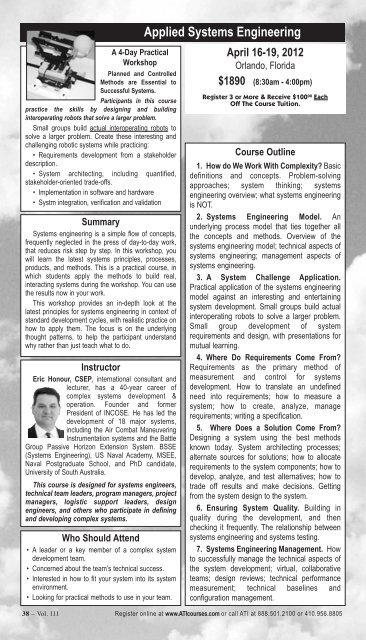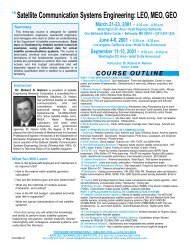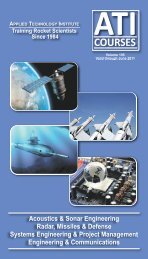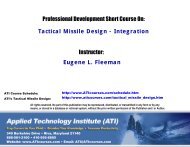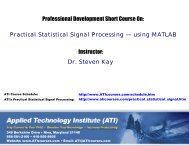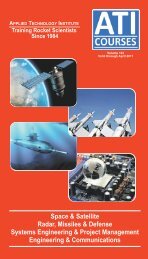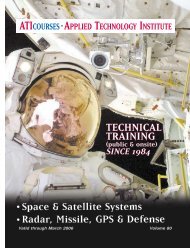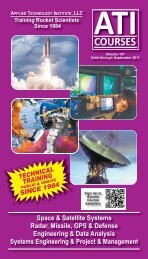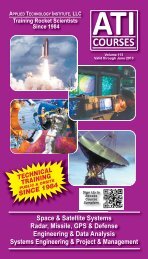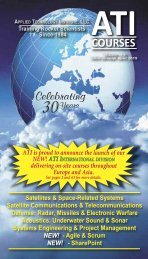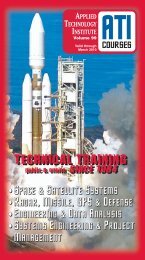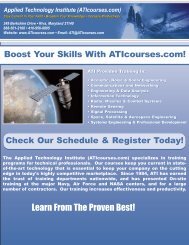Download - Applied Technology Institute
Download - Applied Technology Institute
Download - Applied Technology Institute
You also want an ePaper? Increase the reach of your titles
YUMPU automatically turns print PDFs into web optimized ePapers that Google loves.
<strong>Applied</strong> Systems Engineering<br />
A 4-Day Practical<br />
Workshop<br />
Planned and Controlled<br />
Methods are Essential to<br />
Successful Systems.<br />
Participants in this course<br />
practice the skills by designing and building<br />
interoperating robots that solve a larger problem.<br />
Small groups build actual interoperating robots to<br />
solve a larger problem. Create these interesting and<br />
challenging robotic systems while practicing:<br />
• Requirements development from a stakeholder<br />
description.<br />
• System architecting, including quantified,<br />
stakeholder-oriented trade-offs.<br />
• Implementation in software and hardware<br />
• Systm integration, verification and validation<br />
Summary<br />
Systems engineering is a simple flow of concepts,<br />
frequently neglected in the press of day-to-day work,<br />
that reduces risk step by step. In this workshop, you<br />
will learn the latest systems principles, processes,<br />
products, and methods. This is a practical course, in<br />
which students apply the methods to build real,<br />
interacting systems during the workshop. You can use<br />
the results now in your work.<br />
This workshop provides an in-depth look at the<br />
latest principles for systems engineering in context of<br />
standard development cycles, with realistic practice on<br />
how to apply them. The focus is on the underlying<br />
thought patterns, to help the participant understand<br />
why rather than just teach what to do.<br />
Instructor<br />
Eric Honour, CSEP, international consultant and<br />
lecturer, has a 40-year career of<br />
complex systems development &<br />
operation. Founder and former<br />
President of INCOSE. He has led the<br />
development of 18 major systems,<br />
including the Air Combat Maneuvering<br />
Instrumentation systems and the Battle<br />
Group Passive Horizon Extension System. BSSE<br />
(Systems Engineering), US Naval Academy, MSEE,<br />
Naval Postgraduate School, and PhD candidate,<br />
University of South Australia.<br />
This course is designed for systems engineers,<br />
technical team leaders, program managers, project<br />
managers, logistic support leaders, design<br />
engineers, and others who participate in defining<br />
and developing complex systems.<br />
Who Should Attend<br />
• A leader or a key member of a complex system<br />
development team.<br />
• Concerned about the team’s technical success.<br />
• Interested in how to fit your system into its system<br />
environment.<br />
• Looking for practical methods to use in your team.<br />
April 16-19, 2012<br />
Orlando, Florida<br />
$1890 (8:30am - 4:00pm)<br />
Register 3 or More & Receive $100 00 Each<br />
Off The Course Tuition.<br />
Course Outline<br />
1. How do We Work With Complexity Basic<br />
definitions and concepts. Problem-solving<br />
approaches; system thinking; systems<br />
engineering overview; what systems engineering<br />
is NOT.<br />
2. Systems Engineering Model. An<br />
underlying process model that ties together all<br />
the concepts and methods. Overview of the<br />
systems engineering model; technical aspects of<br />
systems engineering; management aspects of<br />
systems engineering.<br />
3. A System Challenge Application.<br />
Practical application of the systems engineering<br />
model against an interesting and entertaining<br />
system development. Small groups build actual<br />
interoperating robots to solve a larger problem.<br />
Small group development of system<br />
requirements and design, with presentations for<br />
mutual learning.<br />
4. Where Do Requirements Come From<br />
Requirements as the primary method of<br />
measurement and control for systems<br />
development. How to translate an undefined<br />
need into requirements; how to measure a<br />
system; how to create, analyze, manage<br />
requirements; writing a specification.<br />
5. Where Does a Solution Come From<br />
Designing a system using the best methods<br />
known today. System architecting processes;<br />
alternate sources for solutions; how to allocate<br />
requirements to the system components; how to<br />
develop, analyze, and test alternatives; how to<br />
trade off results and make decisions. Getting<br />
from the system design to the system.<br />
6. Ensuring System Quality. Building in<br />
quality during the development, and then<br />
checking it frequently. The relationship between<br />
systems engineering and systems testing.<br />
7. Systems Engineering Management. How<br />
to successfully manage the technical aspects of<br />
the system development; virtual, collaborative<br />
teams; design reviews; technical performance<br />
measurement; technical baselines and<br />
configuration management.<br />
38 – Vol. 111 Register online at www.ATIcourses.com or call ATI at 888.501.2100 or 410.956.8805


